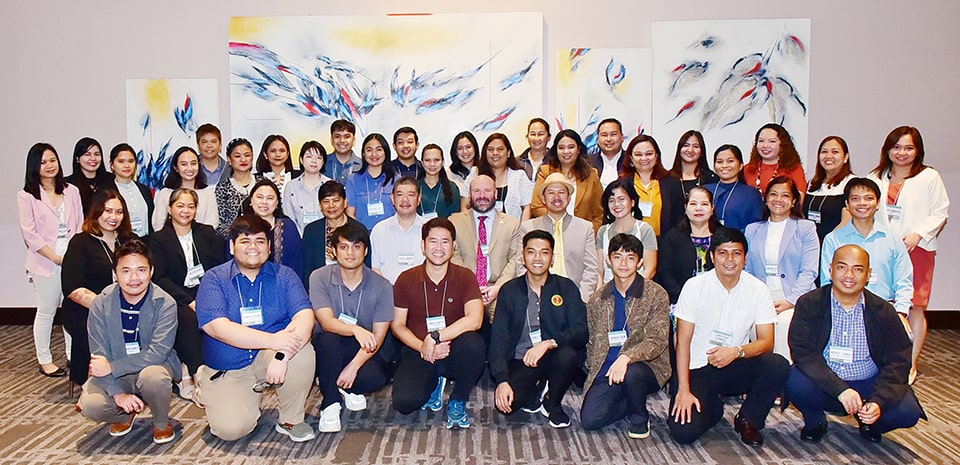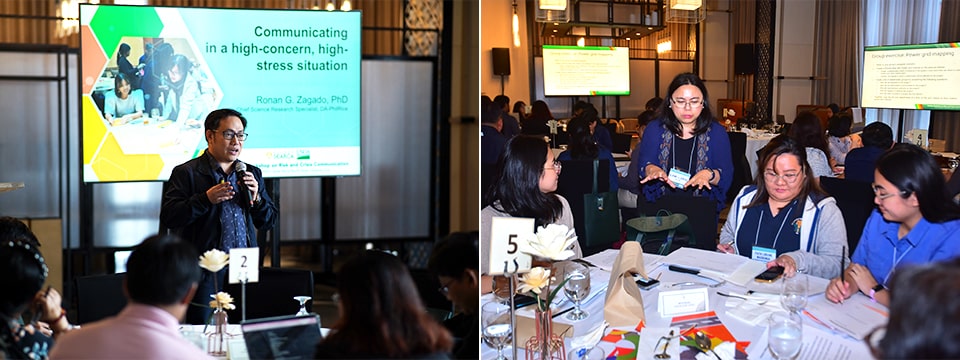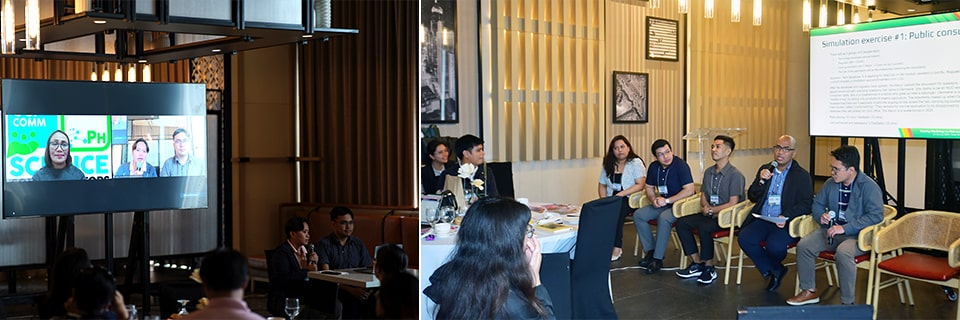 Participants of the training workshop from the Department of Agriculture, Department of Science and Technology, Department of Environment and Natural Resources, Philippine Fiber Industry Development Authority, University of the Philippines Diliman, University of the Philippines Los Baños, University of Southern Mindanao, Visayas State University, Mariano Marcos State University, Biotechnology Coalition of the Philippines, and International Service for the Acquisition of Agri-biotech Applications.
Participants of the training workshop from the Department of Agriculture, Department of Science and Technology, Department of Environment and Natural Resources, Philippine Fiber Industry Development Authority, University of the Philippines Diliman, University of the Philippines Los Baños, University of Southern Mindanao, Visayas State University, Mariano Marcos State University, Biotechnology Coalition of the Philippines, and International Service for the Acquisition of Agri-biotech Applications.
QUEZON CITY, Philippines—The Southeast Asian Regional Center for Graduate Study and Research in Agriculture (SEARCA), under the auspices of the U.S. Department of Agriculture - Foreign Agricultural Service, organized a Training Workshop on Risk and Crisis Communication on 25–26 July 2024 at the Seda Vertis North, Quezon City. Thirty-one biotechnology stakeholders from various government agencies, nongovernmental organizations, and state universities and colleges attended the event to equip the next generation of scientists, researchers, and communicators with essential skills to handle risk and crisis communication effectively, particularly in modern biotechnology.
Clear and effective science communication for biotechnology
Dr. Glenn Gregorio, SEARCA Center Director, stressed the necessity of clear and effective communication in conveying complex scientific concepts like biotechnology to the public. "Effective communication is vital in explaining the intricacies of biotechnology to ensure public understanding and acceptance," he said. Mr. Michael Ward, Agricultural Counselor at the U.S. Embassy Manila, echoed this sentiment, "This training workshop will empower key biotech stakeholders to communicate the value of biotechnology to the people."
In his presentation, Dr. Paul Limson, Director of the Department of Agriculture - Biotechnology Program Office, shared the timeline and the agencies involved in developing agricultural biotechnology in the Philippines. He further elaborated his talk by discussing the adoption of agricultural biotechnology and the country's current biotechnology initiatives.
Meanwhile, the workshop featured Filipino science communication educators and practitioners who shared their expertise through lectures, simulation exercises, and knowledge sharing. Dr. Elaine Llarena from the College of Development Communication, University of the Philippines Los Baños, laid the groundwork with a lecture on the foundational concepts and principles of risk communication, including addressing wicked problems and post-normal science.
Dr. Ronan Zagado, Chief Science Research Specialist of the Department of Agriculture - Philippine Rice Research Institute, shared insights from the Golden Rice team's experience, highlighting effective communication strategies in high-stress situations.
 Dr. Zagado (left) and Dr. Llarena (right) discuss the various strategies for effective communication and the concepts and principles of risk and crisis communication, respectively.
Dr. Zagado (left) and Dr. Llarena (right) discuss the various strategies for effective communication and the concepts and principles of risk and crisis communication, respectively.
Practical training and simulation exercises
To integrate theoretical knowledge with practical application, Ms. Aileen Garcia of the International Rice Research Institute (IRRI) and Dr. Llarena designed simulation exercises and facilitated practical risk communication planning. These activities guided participants in responding to critical situations related to biotechnology and other projects they manage. Ms. Germaine J. De Ruña, a 2019 Global Fellow of Cornell's Alliance for Science, offered valuable tips on handling public consultations, while Dr. Ruby Cristobal of SciCommPH provided guidance on managing difficult, misleading, and sensational questions during live interviews.
Participants also engaged in stakeholder and message mapping exercises, ensuring they could apply their newly acquired skills and knowledge to their respective biotechnology initiatives.
 Participants engage actively in the simulation exercises, such as managing difficult, misleading, and sensational questions during live interviews (left) and handling public consultations (right).
Participants engage actively in the simulation exercises, such as managing difficult, misleading, and sensational questions during live interviews (left) and handling public consultations (right).
Empowering biotechnology communication
Overall, the training workshop marks a significant step toward strengthening the communication capabilities of the country's biotech stakeholders. This resonated with the reflections from the participants, who shared that the workshop has been transformative for them. Aside from enhancing the additional knowledge and skills they gained from the workshop, they were able to make new and meaningful connections. "It made me realize I am not alone in this endeavor," Associate Professor Lourd Franz Gabunada from Visayas State University shared. Additionally, Ms. Marry Grace Balbuena of the University of Southern Mindanao said that the stories shared by the experts made them learn how to handle highly stressed and highly concerned situations. Ms. Jimmbeth Zenila Fabia from Mariano Marcos State University also realized that there is a big responsibility ahead of them: to communicate and make others comprehend what they are doing.